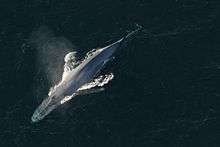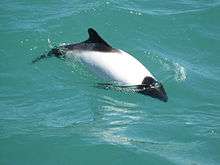Definify.com
Webster 1913 Edition
Cetacea
‖
Ce-ta′ce-a
,Noun.
pl.
[NL., from L.
cetus
whale, Gr. [GREEK].] (Zool.)
An order of marine mammals, including the whales. Like ordinary mammals they breathe by means of lungs, and bring forth living young which they suckle for some time. The anterior limbs are changed to paddles; the tail flukes are horizontal. There are two living suborders:
(a)
The
Mysticete
or whalebone whales, having no true teeth after birth, but with a series of plates of whalebone [see Baleen
.] hanging down from the upper jaw on each side, thus making a strainer, through which they receive the small animals upon which they feed. (b)
The
Denticete
, including the dolphins and sperm whale, which have teeth. Another suborder (Zeuglodontia
) is extinct. The Sirenia
were formerly included in the Cetacea, but are now made a separate order. Definition 2026
Cetacea
Cetacea
Translingual


Proper noun
Cetacea
- A taxonomic order within the superorder Laurasiatheria – the whales, porpoises and dolphins.
Hyponyms
- (order): Neoceti (clade)
- Mysticeti, Odontoceti (suborders)
- †Archaeoceti (extinct suborder)
Translations
taxonomic order
|
cetacea
cetacea
English
Noun
cetacea pl (plural only)
- Whale-like mammals.
- 1882, William Denton, The Deluge in the Light of Modern Science:
- Of cetacea, or whale-like mammals, sixty-five; ruminantia, or cud-chewers, one hundred and seventy-seven; pachydermata, or thick-skinned mammals, such as the horse, hog, and elephant, forty-one; edentata, like the sloth and ant-eater, thirty-five; rodentia, or gnawers, such as the rat, squirrel, and beaver, six hundred and seventeen; carnivora, or flesh-eaters, four hundred and forty-six; cheiroptera, or bats, three hundred and twenty-eight; quadrumana, or monkeys, two hundred and twenty-one; and marsupialia, or pouched mammals, like the opossum and kangaroo, one hundred and thirty-seven.
- 1852, John MacGillivray, Narrative Of The Voyage Of H.M.S. Rattlesnake, Commanded By The Late Captain Owen Stanley, R.N., F.R.S. Etc. During The Years 1846-1850. Including Discoveries And Surveys In New Guinea, The Louisiade Archipelago, Etc. To Which Is Added The Account Of Mr. E.B. Kennedy's Expedition For The Exploration Of The Cape York Peninsula. By John Macgillivray, F.R.G.S. Naturalist To The Expedition. In Two Volumes. Volume 1.:
- PORPOISES AT MORETON BAY. Among the marine animals of Moreton Bay are two cetacea of great interest.
-